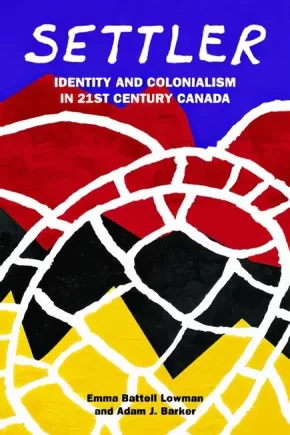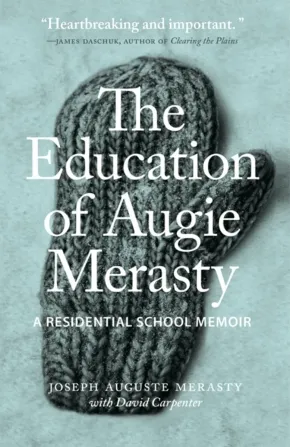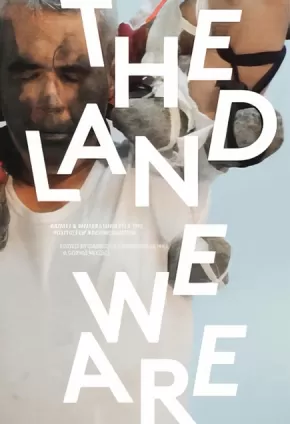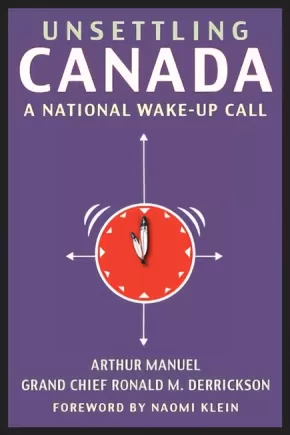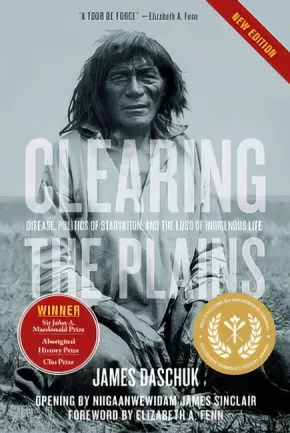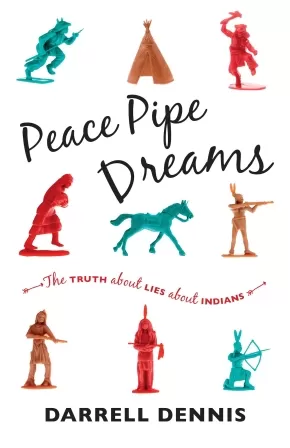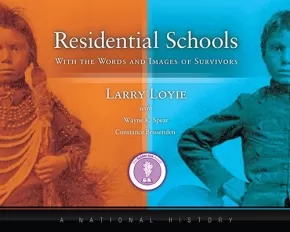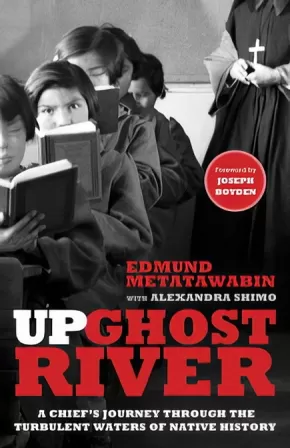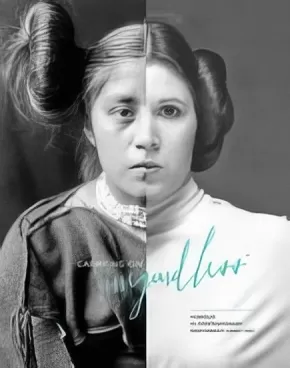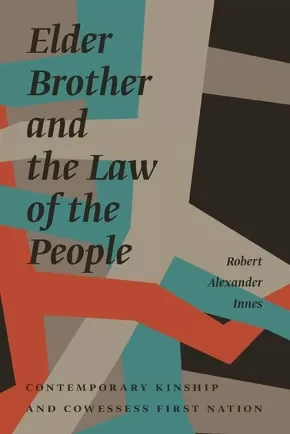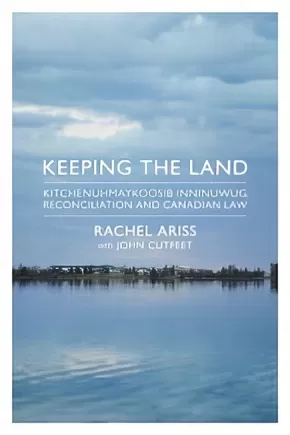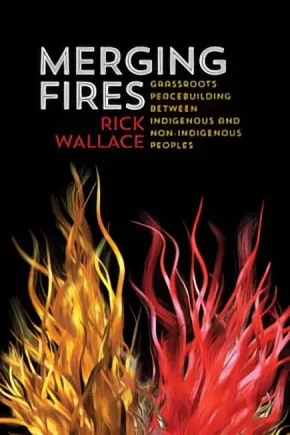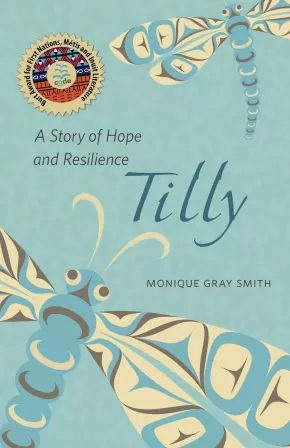
Indigenous History
91
-
105
of
111 Results;
Sort By
Go To
of 8
Settler: Identity and Colonialism in 21st Century Canada
$22.00
Format:
Paperback
Text Content Territories:
Indigenous Canadian;
Grade Levels: University/College;
ISBN / Barcode: 9781552667781
Synopsis:
Synopsis:
Canada has never had an “Indian problem”— but it does have a Settler problem. But what does it mean to be Settler? And why does it matter?
Through an engaging, and sometimes enraging, look at the relationships between Canada and Indigenous nations, Settler: Identity and Colonialism in 21st Century Canada explains what it means to be Settler and argues that accepting this identity is an important first step towards changing those relationships. Being Settler means understanding that Canada is deeply entangled in the violence of colonialism, and that this colonialism and pervasive violence continue to define contemporary political, economic and cultural life in Canada. It also means accepting our responsibility to struggle for change. Settler offers important ways forward — ways to decolonize relationships between Settler Canadians and Indigenous peoples — so that we can find new ways of being on the land, together.
This book presents a serious challenge. It offers no easy road, and lets no one off the hook. It will unsettle, but only to help Settler people find a pathway for transformative change, one that prepares us to imagine and move towards just and beneficial relationships with Indigenous nations. And this way forward may mean leaving much of what we know as Canada behind.
The Education of Augie Merasty: A Residential School Memoir (HC) (9 in Stock)
$21.95
Format:
Hardcover
Text Content Territories:
Indigenous Canadian; First Nations; Cree (Nehiyawak);
ISBN / Barcode: 9780889773684
Synopsis:
Synopsis:
The Education of Augie Merasty offers a courageous and intimate chronicle of life in a residential school.
Now a retired fisherman and trapper, Joseph A. (Augie) Merasty was one of an estimated 150,000 First Nations, Inuit, and Metis children who were taken from their families and sent to government-funded, church-run schools, where they were subjected to a policy of "aggressive assimiliation."As Merasty recounts, these schools did more than attempt to mold children in the ways of white society. They were taught to be ashamed of their native heritage and, as he experienced, often suffered physical and sexual abuse.Even as he looks back on this painful part of his childhood, Merasty’s generous and authentic voice shines through.
Awards
- 2016 Burt Award Second Place Winner
Reviews
"At 86, Augie Merasty has been a lot of things: Father. Son. Outdoorsman. Homeless. But now he is a first-time author, and the voice of a generation of residential-school survivors.... The Education of Augie Merasty is the tale of a man not only haunted by his past, but haunted by the fundamental need to tell his own story... one of the most important titles to be published this spring." —Globe and Mail
"[Augie] wrote his memoir to show people the unbelievable atrocities suffered by so many Indigenous people and in the hope that others would come forward to tell their stories of what happened in the residential schools." —Eagle Feather News
"This book is so much bigger than its small size. It is a path to healing. We cannot change history, but we can acknowledge it, learn about it, and remember it." —Prairies North
"The Education of Augie Merasty might be a small book, but it carries a punch to it that all Canadian need to read and understand." —Rabble
"A truly extraordinary memoir by a truly extraordinary man." —Midwest Book Review
"Carpenter's introduction and afterword... allow us to come to better understand Augie's 'sometimes chaotic, sometimes heroic aftermath of his life,' as Carpenter describes his last decade. Where Augie focuses on physical scars, Carpenter's experiences with Augie illustrate the long-term impacts on his residential school experience. And with The Education of Augie Merasty, he helps Merasty--who could be any number of individuals we each pass on the street--find his voice." —Active History
"Unsettling and profound, and good." —Blacklock's Reporter
"In this book I have seen horror through eyes of a child." —James Daschuk, author of Clearing the Plains
"A story in which our entire nation has an obscure and dark complicity." —David Carpenter, co-author of The Education of Augie Merasty and author of The Gold and other books
Educator Information
The Canadian Indigenous Books for Schools list recommends this resource for Grades 9-12 English Language Arts and Social Studies.
Caution: Mature subject matter and descriptions of discrimination, sexual/physical violence, and substance abuse.
Additional Information
105 pages | 4.25" x 6.53" | Hardcover
The Land We Are: Artists and Writers Unsettle the Politics of Reconciliation
$24.95
Editors:
Format:
Paperback
Text Content Territories:
Indigenous Canadian;
ISBN / Barcode: 9781894037631
Synopsis:
Synopsis:
The Land We Are is a stunning collection of writing and art that interrogates the current era of reconciliation in Canada. Using visual, poetic, and theoretical language, the contributors approach reconciliation as a problematic narrative about Indigenous-settler relations, but also as a site where conversations about a just future must occur. The result of a four-year collaboration between artists and scholars engaged in resurgence and decolonization, The Land We Are is a moving dialogue that blurs the boundaries between activism, research, and the arts.
The contributors to this book include leading artists and scholars engaged in questions of resurgence, restitution, and decolonization.
Contributors: Jordan Abel, Leah Decter, Jonathan Dewar, David Garneau, Ayumi Goto, Allison Hargreaves, Gabrielle L'Hirondelle Hill, Jaimie Isaac, David Jefferess, Layli Long Soldier, The New BC Indian Art and Welfare Society Collective, Sophie McCall, Peter Morin, Skeena Reece, Dylan Robinson, Sandra Semchuk, Adrian Stimson, Clement Yeh, and Keren Zaiontz.
Reviews
"This beautifully produced, richly illustrated volume not only offers readers a visual journey into the featured artistic installations and performance pieces, but through its creative use of text and graphic design is itself an artistic statement on reconciliation." --Winnipeg Free Press
Educator Information
Recommended for students in grades 11 and 12, as well as at a college/university level.
Additional Information
240 pages | 6.50" x 9.50"
Unsettling Canada: A National Wake-Up Call
$29.95
Format:
Paperback
Text Content Territories:
Indigenous Canadian;
ISBN / Barcode: 9781771131766
Synopsis:
Synopsis:
Unsettling Canada, a Canadian bestseller, is built on a unique collaboration between two First Nations leaders, Arthur Manuel and Grand Chief Ron Derrickson.
Both men have served as chiefs of their bands in the B.C. interior and both have gone on to establish important national and international reputations. But the differences between them are in many ways even more interesting. Arthur Manuel is one of the most forceful advocates for Aboriginal title and rights in Canada and comes from the activist wing of the movement. Grand Chief Ron Derrickson is one of the most successful Indigenous businessmen in the country.
Together the Secwepemc activist intellectual and the Syilx (Okanagan) businessman bring a fresh perspective and new ideas to Canada’s most glaring piece of unfinished business: the place of Indigenous peoples within the country’s political and economic space. The story is told through Arthur’s voice but he traces both of their individual struggles against the colonialist and often racist structures that have been erected to keep Indigenous peoples in their place in Canada.
In the final chapters and in the Grand Chief’s afterword, they not only set out a plan for a new sustainable indigenous economy, but lay out a roadmap for getting there.
Reviews
“This is the back story of both grassroots and backroom struggles that created the context in which we find ourselves today, one in which a new generation of First Nations leaders is demanding sovereignty and self-determination, and more and more non-Indigenous Canadians finally understand that huge swaths of this country we call Canada is not ours - or our government's - to sell.” — Naomi Klein, from the Foreword
“Pragmatic and helpful, this is a timely book for our fraught and political moment” — Quill & Quire
"Unsettling Canada is a breathtakingly beautiful story of Indigenous resistance, strength, and movement building. Unsettling Canada echoes the power of George Manuel's The Fourth World, centering the heart of the narrative deep inside a kind of Indigenous intelligence rarely shared outside our communities. This is the critical conversation that Canada and Indigenous peoples must have because it is centred on land, and, therefore, it is one of the most important books on Indigenous politics I've ever read." — Leanne Betasamosake Simpson, author of Dancing on Our Turtle's Back
Educator Information
This resource would be useful for courses in history, social justice, political science, and social studies. Recommended for students in grades 10 to 12 or those at a college/university level.
CONTENTS
Foreword Naomi Klein
Chapter 1 The Lay of the Land
Chapter 2 Institutionalizing a People: Indian Hospital, School, Jail
Chapter 3 White Paper to Red Paper: Drawing the Battle Lines
Chapter 4 Occupy Indian Affairs: Native Youth in Action
Chapter 5 Aboriginal Title: No Surrender
Chapter 6 The Constitution Express: A Grassroots Movement
Chapter 7 Don’t Let Them Bully You: A Business Interlude
Chapter 8 A Chief’s Concerns: Finances, the People, and the Land
Chapter 9 Upping the Ante: RCAP and a Landmark Court Decision
Chapter 10 The Battle in the Forest: The Trade in Indian Trees
Chapter 11 Sun Peaks to Geneva: Playgrounds and Fortresses
Chapter 12 Taking It to the Bank: Accounting for Unpaid Debt
Chapter 13 The Fourth World: A Global Movement
Chapter 14 Line of Defence: Side by Side for Mother Earth
Chapter 15 No Half Measures: The Price of Uncertainty
Chapter 16 Days of Protest: Young Activists Come Together
Chapter 17 The End of Colonialism
Afterword Grand Chief Ronald M. Derrickson
Acknowledgements
Appendix United Nations Declaration on the Rights of Indigenous Peoples
Notes
Index
Additional Information
288 pages | 6.00" x 9.00"
Unsettling Canada: A National Wake-Up Call - Second Edition
$29.95
Format:
Paperback
Text Content Territories:
Indigenous Canadian;
ISBN / Barcode: 9781771135566
Synopsis:
Synopsis:
A Canadian bestseller and winner of the 2016 Canadian Historical Association Aboriginal History Book Prize, Unsettling Canada is a landmark text built on a unique collaboration between two First Nations leaders.
Arthur Manuel (1951-2017) was one of the most forceful advocates for Indigenous title and rights in Canada; Grand Chief Ron Derrickson, one of the most successful Indigenous businessmen in the country. Together, they bring a fresh perspective and bold new ideas to Canada's most glaring piece of unfinished business: the place of Indigenous peoples within the country's political and economic space.
This vital second edition features a foreword by award-winning activist Naomi Klein and an all-new chapter co-authored by law professor Nicole Schabus and Manuel's son, Ska7cis, honouring the multi-generational legacy of the Manuel family's work.
Reviews
“Pragmatic and helpful, this is a timely book for our fraught and political moment” — Quill & Quire
"Unsettling Canada is a breathtakingly beautiful story of Indigenous resistance, strength, and movement building. Unsettling Canada echoes the power of George Manuel's The Fourth World, centering the heart of the narrative deep inside a kind of Indigenous intelligence rarely shared outside our communities. This is the critical conversation that Canada and Indigenous peoples must have because it is centred on land, and, therefore, it is one of the most important books on Indigenous politics I've ever read." — Leanne Betasamosake Simpson, author of Dancing on Our Turtle's Back
Educator Information
This resource would be useful for courses in history, social justice, political science, and social studies. Recommended for students in grades 10 to 12 or those at a college/university level.
Additional Information
320 pages | 6.00" x 9.00"
Clearing the Plains: Disease, Politics of Starvation, and the Loss of Indigenous Life
$27.95
Format:
Paperback
Text Content Territories:
Indigenous Canadian;
ISBN / Barcode: 9780889776227
Synopsis:
Synopsis:
Revealing how Canada's first Prime Minister used a policy of starvation against Indigenous people to clear the way for settlement, the multiple award-winning Clearing the Plains sparked widespread debate about genocide in Canada.
In arresting, but harrowing, prose, James Daschuk examines the roles that Old World diseases, climate, and, most disturbingly, Canadian politics—the politics of ethnocide—played in the deaths and subjugation of thousands of Indigenous people in the realization of Sir John A. Macdonald’s "National Dream."
It was a dream that came at great expense: the present disparity in health and economic well-being between Indigenous and non-Indigenous populations, and the lingering racism and misunderstanding that permeates the national consciousness to this day.
This new edition of Clearing the Plains has a foreword by Pulitzer Prize winning author, Elizabeth Fenn, an opening by Niigaanwewidam James Sinclair, and explanations of the book’s influence by leading Canadian historians. Called “one of the most important books of the twenty-first century” by the Literary Review of Canada, it was named a “Book of the Year” by The Globe and Mail, Quill & Quire, the Writers’ Trust, and won the Sir John A. Macdonald Prize, among many others.
Reviews
"Clearing the Plains is a tour de force that dismantles and destroys the view that Canada has a special claim to humanity in its treatment of indigenous peoples. Daschuk shows how infectious disease and state-supported starvation combined to create a creeping, relentless catastrophe that persists to the present day. The prose is gripping, the analysis is incisive, and the narrative is so chilling that it leaves its reader stunned and disturbed. For days after reading it, I was unable to shake a profound sense of sorrow. This is fearless, evidence-driven history at its finest." —Elizabeth A. Fenn, author of Pox Americana
"Required reading for all Canadians." —Candace Savage, author of A Geography of Blood
"Clearly written, deeply researched, and properly contextualized history...Essential reading for everyone interested in the history of indigenous North America." —J.R. McNeill, author of Mosquito Empires
Additional Information
386 pages | 6.00" x 9.00" | 25 b&w photos, 7 maps and figures | Paperback
Peace Pipe Dreams
$22.95
Format:
Paperback
Text Content Territories:
Indigenous Canadian; Métis; Inuit; First Nations;
ISBN / Barcode: 9781771000406
Synopsis:
Synopsis:
In 2015-2016, Peace Pipe Dreams was the award recipient for First Nation Communities Read.
Darrell Dennis is a stereotype-busting, politically incorrect Native American/Aboriginal/Shuswap (Only he's allowed to call himself an "Indian." Maybe. Under some circumstances). With a large dose of humour and irreverence, he untangles some of the truths and myths about First Nations: Why do people think Natives get free trucks, and why didn't he ever get one? Why does the length of your hair determine whether you’re good or bad? By what ratio does the amount of rain in a year depend on the amount of cactus liquor you consume?
In addition to answering these burning questions, Dennis tackles some tougher subjects. He looks at European-Native interactions in North America from the moment of first contact, discussing the fur trade, treaty-signing and the implementation of residential schools. Addressing misconceptions still widely believed today, Dennis explains why Native people aren't genetically any more predisposed to become alcoholics than Caucasians; that Native religion doesn't consist of worshipping rocks, disappearing into thin air, or conversing with animals; and that tax exemptions are so limited and confusing that many people don't even bother.
Employing pop culture examples, personal anecdote and a cutting wit, Darrell Dennis deftly weaves history with current events to entertain, inform and provide a convincing, readable overview of First Nations issues and why they matter today.
Additional Information
224 pages | 5.65" x 8.52"
Residential Schools, With the Words and Images of Survivors
$34.95
Format:
Hardcover
Text Content Territories:
Indigenous Canadian;
ISBN / Barcode: 9780993937101
Synopsis:
Synopsis:
Residential Schools, With the Words and Images of Survivors, A National History honours the survivors, the former students, who attended residential schools. Designed for the general reader this accessible, 112-page history offers a first-person perspective of the residential school system in Canada, as it shares the memories of more than 70 survivors from across Canada as well as 125 archival and contemporary images (65 black & white photographs, 51 colour, some never before published).
This essential volume written by award-winning author Larry Loyie (Cree), a survivor of St. Bernard Mission residential school in Grouard, AB, and co-authored by Constance Brissenden and Wayne K. Spear (Mohawk), reflects the ongoing commitment of this team to express the truths about residential school experiences and to honour the survivors whose voices are shared in this book.
Along with the voices, readers will be engaged by the evocative, archival photographs provided by the Shingwauk Residential Schools Centre with the assistance of curator Krista McCracken. The book begins with the moving introduction by Larry Loyie, and moves to seven chapters that explore the purpose of this school system; cultures and traditions; leaving home; life at school the half-day system; the dark side of the schools; friendship and laughter coping with a new life; changing world–the healing begins; and an afterword. A detailed, full colour map showing residential schools, timeline with key dates, glossary, and a helpful index (including names of survivors and schools) make this vital resource a must-have for secondary, college, and universities, libraries, and the general reader.
Reviews
"A broad and comprehensive review of the history of First Nations, Métis, and Inuit peoples in Canada told from the perspective of First Peoples in a very accessible way. Any educator, regardless of personal background or heritage, would find this timely resource very useful in any classroom." — Gary Fenn and Domenic Bellissimo, executive assistants, Ontario Secondary School Teachers’ Federation
"Written with a gentle hand, this book describes a history that few Canadians understand or even know about. From the first page, those in search of the truth are engaged in a journey of learning, as they come to understand the true battle of Aboriginal peoples to preserve their cultures and pride. This story is a true account of resiliency and human spirit." — Tracy Zweifel, executive director, Sagitawa Friendship Society, Alberta
Awards
- 2016 Winner of Golden Oak award in Ontario's Forest of Reading program
Educator Information
This must-have resource includes a detailed, full-colour map showing residential schools, a timeline with key dates, and a glossary.
Recommended for grades 7-12, but would still be useful for adults and college/university courses studying residential schools and Indigenous history.
This book has been evaluated and approved by ERAC (Educational Resource Acquisition Consortium, British Columbia).
Additional Information
112 pages | 10.43" x 8.26"
Up Ghost River: A Chief's Journey Through the Turbulent Waters of Native History
$22.00
Format:
Paperback
Text Content Territories:
Indigenous Canadian; First Nations; Cree (Nehiyawak);
ISBN / Barcode: 9780307399885
Synopsis:
Synopsis:
A powerful, raw yet eloquent memoir from a residential school survivor and former First Nations Chief, Up Ghost River is a necessary step toward our collective healing.
In the 1950s, 7-year-old Edmund Metatawabin was separated from his family and placed in one of Canada’s worst residential schools. St. Anne’s, in northern Ontario, is an institution now notorious for the range of punishments that staff and teachers inflicted on students. Even as Metatawabin built the trappings of a successful life—wife, kids, career—he was tormented by horrific memories. Fuelled by alcohol, the trauma from his past caught up with him, and his family and work lives imploded.
In seeking healing, Metatawabin travelled to southern Alberta. There he learned from elders, participated in native cultural training workshops that emphasize the holistic approach to personhood at the heart of Cree culture, and finally faced his alcoholism and PTSD. Metatawabin has since worked tirelessly to expose the wrongdoings of St. Anne’s, culminating in a recent court case demanding that the school records be released to the Truth and Reconciliation Commission.
Now Metatawabin’s mission is to help the next generation of residential school survivors. His story is part of the indigenous resurgence that is happening across Canada and worldwide: after years of oppression, he and others are healing themselves by rediscovering their culture and sharing their knowledge.
Coming full circle, Metatawabin’s haunting and brave narrative offers profound lessons on the importance of bearing witness, and the ability to become whole once again.
Carrying on
$24.95
Artists:
Format:
Paperback
Text Content Territories:
Indigenous Canadian; First Nations;
ISBN / Barcode: 978-0-9812341-2-0
Synopsis:
Synopsis:
Carrying on "Irregardless" is a handsomely illustrated paperback based on the first exhibition to focus on humour in Northwest Coast First Nations art. The show, mounted by the Bill Reid Gallery of Northwest Coast Art in Vancouver is titled after one of Bill Reid's favourite deliberate grammatical blunders that were part of the sense of humour that, as Martine J. Reid says in her introduction, "was perhaps a part of his survival kit, as it often seems to be for First Nations people."
Within this book are the photographed artworks of twenty-eight prominent Northwest Coast artists, including such varied approaches to humour as a rare prehistoric Coast Salish bowl featuring a smiling face carved from stone, a 1990s etching depicting Raven and the First Men Overlooking Wreck Beach (to catch a glimpse at all the nudists, of course!) and a pair of red and yellow cedar bark high heels titled Too Haida. Collected here are artworks that act as political weapons, bold challenges to stereotypes, and nods to the Trickster. They satirize, ridicule and play. And, above all, they make us laugh, and think, and laugh again.
Accompanying the work are descriptions, quips and jokes from the artists themselves. And preceding it stands three impassioned contextualizing essays that range from the poetic to the academic to the anecdotal, by Tahltan artist, stand-up comedian and co-curator, Peter Morin; Director of Content and Research for the Bill Reid Gallery of Northwest Coast Art and co-curator, Martine J. Reid; and CEO of the Bill Reid Trust and Director for the Bill Reid Gallery of Northwest Coast Art, Mike Robinson.
Elder Brother and the Law of the People: Contemporary Kinship and Cowessess First Nation
$27.95
Format:
Paperback
Text Content Territories:
Indigenous Canadian; First Nations; Anishinaabeg; Ojibway; Saulteaux; Cree (Nehiyawak);
ISBN / Barcode: 9780887557460
Synopsis:
Synopsis:
In the pre-reserve era, Aboriginal bands in the northern plains were relatively small multicultural communities that actively maintained fluid and inclusive membership through traditional kinship practices. These practices were governed by the Law of the People as described in the traditional stories of Wîsashkêcâhk, or Elder Brother, that outlined social interaction, marriage, adoption, and kinship roles and responsibilities.
In Elder Brother and the Law of the People, Robert Innes offers a detailed analysis of the role of Elder Brother stories in historical and contemporary kinship practices in Cowessess First Nation, located in southeastern Saskatchewan. He reveals how these tradition-inspired practices act to undermine legal and scholarly definitions of “Indian” and counter the perception that First Nations people have internalized such classifications. He presents Cowessess’s successful negotiation of the 1996 Treaty Land Agreement and their high inclusion rate of new “Bill-C31s” as evidence of the persistence of historical kinship values and their continuing role as the central unifying factor for band membership.
Additional Information
216 pages | 6.00" x 9.00" | Paperback
Keeping the Land
$22.95
Format:
Paperback
Text Content Territories:
Indigenous Canadian; First Nations; Anishinaabeg; Oji-Cree;
ISBN / Barcode: 9781552664773
Synopsis:
Synopsis:
When the Kitchenuhmaykoosib Inninuwug’s traditional territory was threatened by mining exploration in 2006, they followed their traditional duty to protect the land and asked the mining exploration company, Platinex, to leave. Platinex left — and then sued the remote First Nation for $10 billion. The ensuing legal dispute lasted two years and eventually resulted in the jailing of community leaders. Ariss argues that though this jailing was extraordinarily punitive and is indicative of continuing colonialism within the legal system, some aspects of the case demonstrate the potential of Canadian law to understand, include and reflect Aboriginal perspectives. Connecting scholarship in Aboriginal rights and Canadian law, traditional Aboriginal law, social change and community activism, Keeping the Land explores the twists and turns of this legal dispute in order to gain a deeper understanding of the law’s contributions to and detractions from the process of reconciliation.
Merging Fires (1 in Stock) - ON SALE!
$17.00 $22.95
Format:
Paperback
Text Content Territories:
Indigenous Canadian;
ISBN / Barcode: 9781552665794
Synopsis:
Synopsis:
The past two decades have witnessed the emerging role of grassroots social movements and community-based peacebuilding as key sites of transformative political and cultural engagement. Merging Fires offers case studies of grassroots alliance building between non-Indigenous activists and three Indigenous communities:
the Chippewa of Nawash,the Grassy Narrows First Nation and the Anishinaabe Grand Council of Treaty #3. These Canadian examples offer insights into the challenges, limitations and complexities of transformative, community-based alliance building and raise critical questions about power, knowledge and pedagogy at the grassroots level.
While this analysis is uniquely Canadian in scope, Merging Fires is of great political relevance in light of the Idle No More movement as well as similar decolonizing initiatives occurring globally. Rick Wallace’s research methodologies and ethics of solidarity are starkly different from many mainstream academic approaches, and his documentation of on-the-ground efforts at peacebuilding fills an important gap in the field.
Additional Information
178 pages | 6.00" x 9.00"
Tilly: A Story of Hope and Resilience
$19.95
Format:
Paperback
Text Content Territories:
Indigenous Canadian; First Nations; Sioux; Lakota; Cree (Nehiyawak);
ISBN / Barcode: 978-1-55039-209-8
Synopsis:
Synopsis:
Tilly has always known she’s part Lakota on her dad’s side. She’s grown up with the traditional teachings of her grandma, relishing the life lessons of her beloved mentor. But it isn’t until an angry man shouts something on the street that Tilly realizes her mom is Aboriginal, too—a Cree woman taken from her own parents as a baby.
Tilly feels her mother’s pain deeply. She’s always had trouble fitting in at school, and when her grandma dies unexpectedly, her anchor is gone. Then Abby, a grade seven classmate, invites her home for lunch and offers her “something special” to drink. Nothing has prepared Tilly for the tingling in her legs, the buzz in her head and the awesome feeling that she can do anything. From then on, partying seems to offer an escape from her insecurities. But after one dangerously drunken evening, Tilly knows she has to change. Summoning her courage, she begins the long journey to finding pride in herself and her heritage. Just when she needs it most, a mysterious stranger offers some wise counsel: “Never question who you are or who your people are. It’s in your eyes. I know it’s in your heart.”
Loosely based on author Monique Gray Smith’s own life, this revealing, important work of creative non-fiction tells the story of a young Indigenous woman coming of age in Canada in the 1980s. With compassion, insight and humour, Gray Smith illuminates the 20th-century history of Canada’s First Peoples—forced displacement, residential schools, tuberculosis hospitals, the Sixties Scoop. In a spirit of hope, this unique story captures the irrepressible resilience of Tilly, and of Indigenous peoples everywhere.
Awards
- 2014 Burt Award Winner
Reviews
“What a gorgeous read! Reminiscent of Lee Maracle’s Will’s Garden and Ruby Slipperjack’s Little Voice, Tilly will bring strength, comfort and peace to all who read it. Let it discover and inspire you, too. Wow! I've been waiting for a book like this for years. Mahsi cho, Monique Gray Smith, for digging so deep to create something so loving and nurturing for the world.” —Richard Van Camp, author of The Lesser Blessed and The Moon of Letting Go
"Gray Smith intricately pieces together stories, traditional teachings and hard-earned personal wisdom, creating a hand-stitched quilt you can’t help but wrap yourself in—a quilt filled with optimism and the assurance that no matter how lost we are, hope, love and guidance surround us at every turn. Delicate with the handling of mature details, but fiercely candid with emotion, Tilly is an ideal resource not only for youth, but also for those who are easily triggered, while its universality will be appreciated by a wider audience. A brave new voice ready to take her place among the great contemporary storytellers, Gray Smith breaks her own trails as she explores what it means to be Indigenous in a modern world." —Christy Jordan-Fenton, author of Fatty Legs, A Stranger at Home and When I Was Eight
Educator Information
Recommended Ages: 15-18.
Grades 10-12 English First Peoples resource for units on Childhood through the Eyes of Indigenous Writers and Exploring Text through Local Landscape.
Additional Information
208 pages | Ages 14+
Dancing on Our Turtle's Back
$24.95
Format:
Paperback
Text Content Territories:
Indigenous Canadian;
ISBN / Barcode: 9781894037501
Synopsis:
Synopsis:
Many promote Reconciliation as a “new” way for Canada to relate to Indigenous Peoples. In Dancing on Our Turtle’s Back: Stories of Nishnaabeg Re-Creation, Resurgence, and a New Emergence activist, editor, and educator Leanne Simpson asserts reconciliation must be grounded in political resurgence and must support the regeneration of Indigenous languages, oral cultures, and traditions of governance.
Simpson explores philosophies and pathways of regeneration, resurgence, and a new emergence through the Nishnaabeg language, Creation Stories, walks with Elders and children, celebrations and protests, and meditations on these experiences. She stresses the importance of illuminating Indigenous intellectual traditions to transform their relationship to the Canadian state.
Challenging and original, Dancing on Our Turtle’s Back provides a valuable new perspective on the struggles of Indigenous Peoples.
Additional Information
168 pages | 5.50" x 8.50" | Paperback
Sort By
Go To
of 8

